The Complete Blood Count (CBC) test is one of the most commonly ordered blood tests. It provides valuable insights into your overall health by measuring different components of your blood, including red blood cells, white blood cells, hemoglobin, hematocrit, and platelets. While receiving a CBC report can seem overwhelming at first, understanding its components can empower you to better discuss your health with your doctor.
Here’s a breakdown of what a CBC measures and what the results might indicate.
What Is a CBC Blood Test?
A CBC measures the levels and characteristics of different blood components, helping to detect a variety of conditions, such as infections, anemia, and immune system disorders. Your doctor may order a CBC as part of a routine health check-up, to diagnose symptoms like fatigue or fever, or to monitor existing health conditions.
Key Components of a CBC Test and What They Mean
1. White Blood Cells (WBCs)
White blood cells are part of your immune system and help fight infections.
- Normal Range: 4,000–11,000 cells per microliter (mcL)
- High WBC Count: May indicate infection, inflammation, stress, or, in rare cases, certain cancers like leukemia.
- Low WBC Count: Could suggest a weakened immune system, bone marrow issues, or conditions like autoimmune disorders or viral infections.
2. Red Blood Cells (RBCs)
Red blood cells transport oxygen throughout your body.
- Normal Range:
- Men: 4.7–6.1 million cells per mcL
- Women: 4.2–5.4 million cells per mcL
- Children: 4.1–5.5 million cells per mcL
- High RBC Count: May be due to dehydration, smoking, or conditions like polycythemia vera.
- Low RBC Count: Could indicate anemia, blood loss, nutritional deficiencies (iron, vitamin B12, folate), or chronic diseases.
3. Hemoglobin (Hgb)
Hemoglobin is the protein in red blood cells that carries oxygen.
- Normal Range:
- Men: 13.8–17.2 grams per deciliter (g/dL)
- Women: 12.1–15.1 g/dL
- Children: 11–16 g/dL
- High Hemoglobin: May indicate dehydration, living at high altitudes, or conditions like COPD.
- Low Hemoglobin: Suggests anemia, blood loss, or a nutritional deficiency.
4. Hematocrit (Hct)
Hematocrit measures the percentage of red blood cells in your blood.
- Normal Range:
- Men: 40.7–50.3%
- Women: 36.1–44.3%
- Children: 32.9–44.5%
- High Hematocrit: Often linked to dehydration, smoking, or diseases that affect oxygen levels.
- Low Hematocrit: Indicates anemia, blood loss, or nutritional deficiencies.
5. Platelets (PLT)
Platelets help your blood clot and stop bleeding.
- Normal Range: 150,000–450,000 platelets per mcL
- High Platelet Count: May be due to inflammation, infection, or conditions like thrombocythemia.
- Low Platelet Count: Could suggest a bleeding disorder, bone marrow issues, or certain medications like chemotherapy.
Additional Insights from a CBC
Mean Corpuscular Volume (MCV)
MCV measures the average size of your red blood cells.
- High MCV: May indicate vitamin B12 or folate deficiency.
- Low MCV: Could point to iron deficiency anemia or thalassemia.
Mean Corpuscular Hemoglobin (MCH) and Mean Corpuscular Hemoglobin Concentration (MCHC)
These measure the amount and concentration of hemoglobin in your red blood cells.
- High Values: May suggest macrocytic anemia.
- Low Values: Could indicate iron deficiency or microcytic anemia.
Red Cell Distribution Width (RDW)
RDW indicates the variation in red blood cell size.
- High RDW: Often seen in anemia caused by iron, B12, or folate deficiencies.
What Happens if Your Results Are Abnormal?
Abnormal results don’t always indicate a serious condition. Temporary factors like dehydration, recent infections, or medications can impact your CBC. If your results fall outside the normal range, your doctor may:
- Repeat the test to confirm the results.
- Order additional tests to identify underlying causes.
- Discuss lifestyle changes, medications, or treatments to address any issues.
CBC Blood Test Result Pictures
Pictures showing the result of several CBC blood tests including results for both male and female individuals.
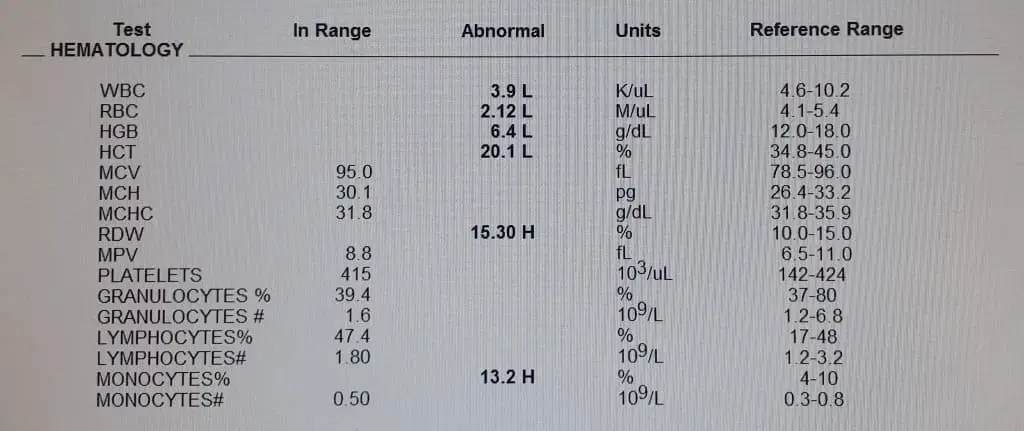
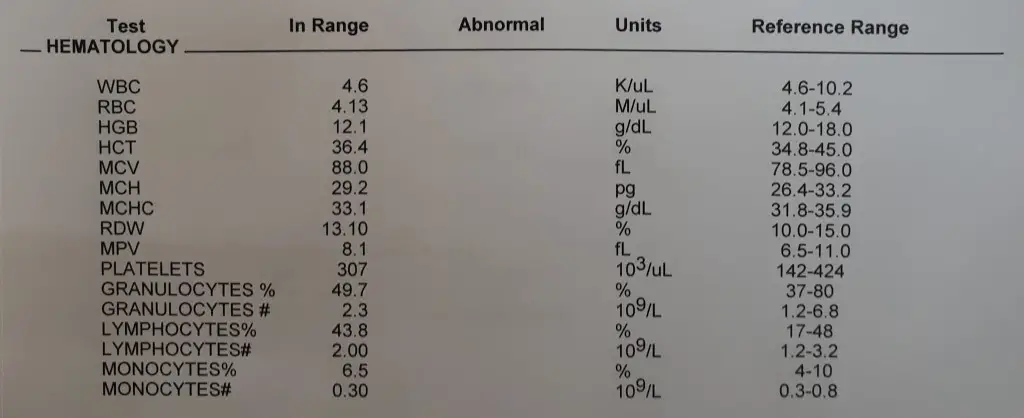
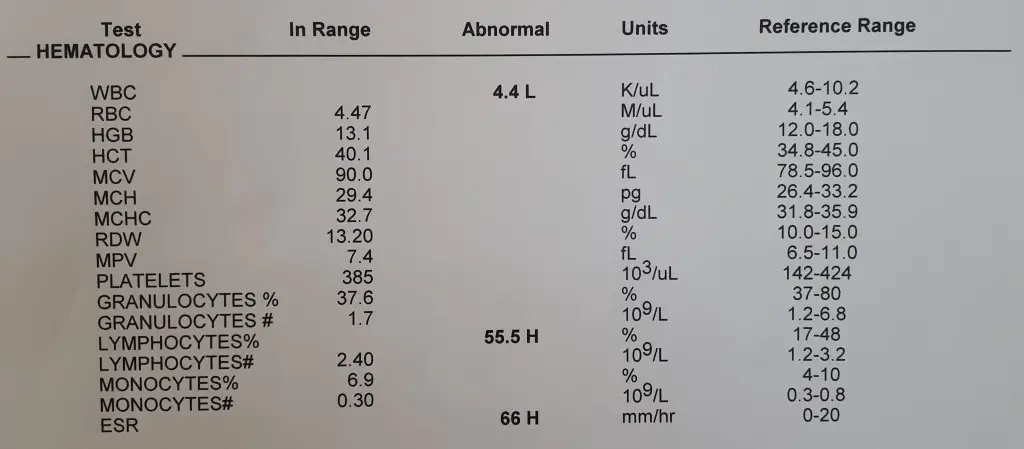
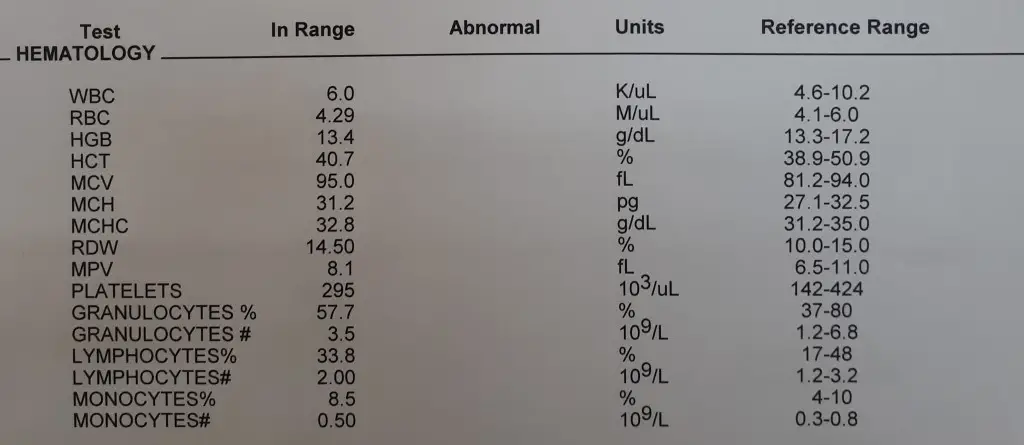
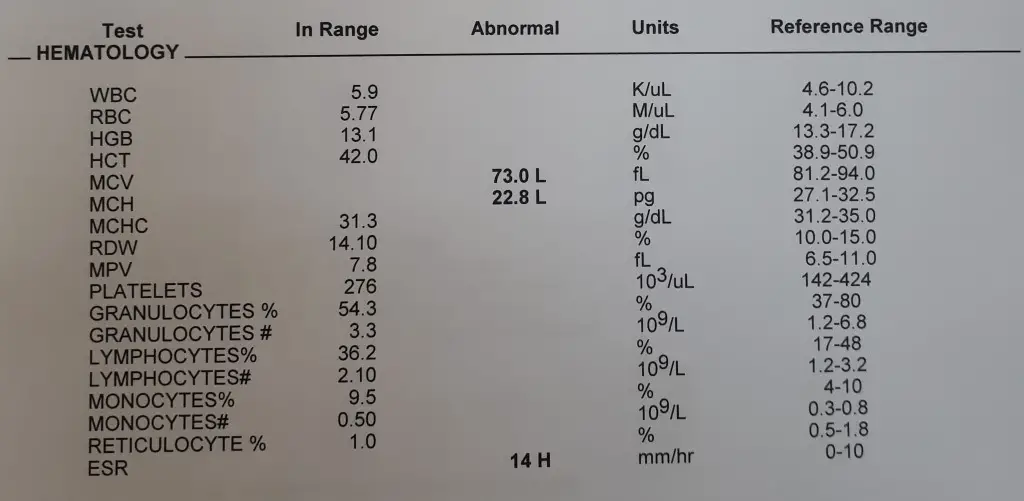
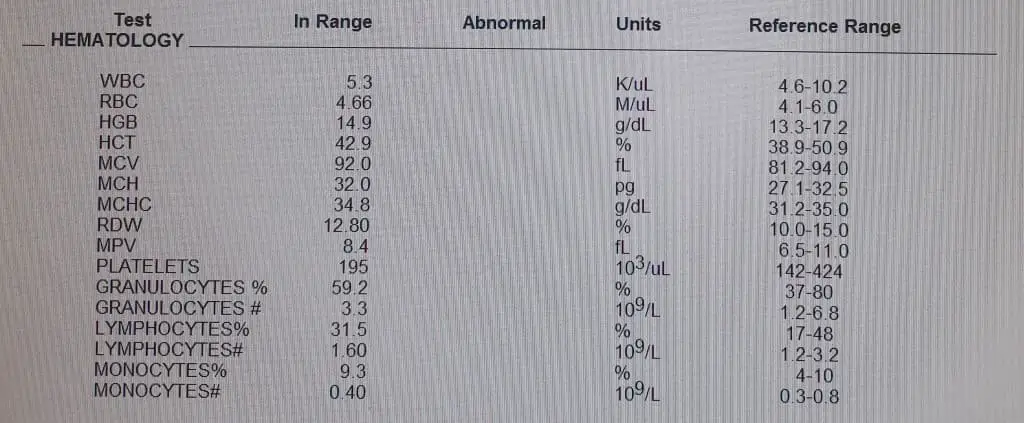
Related Article understanding Your Lipid Blood Test Results
